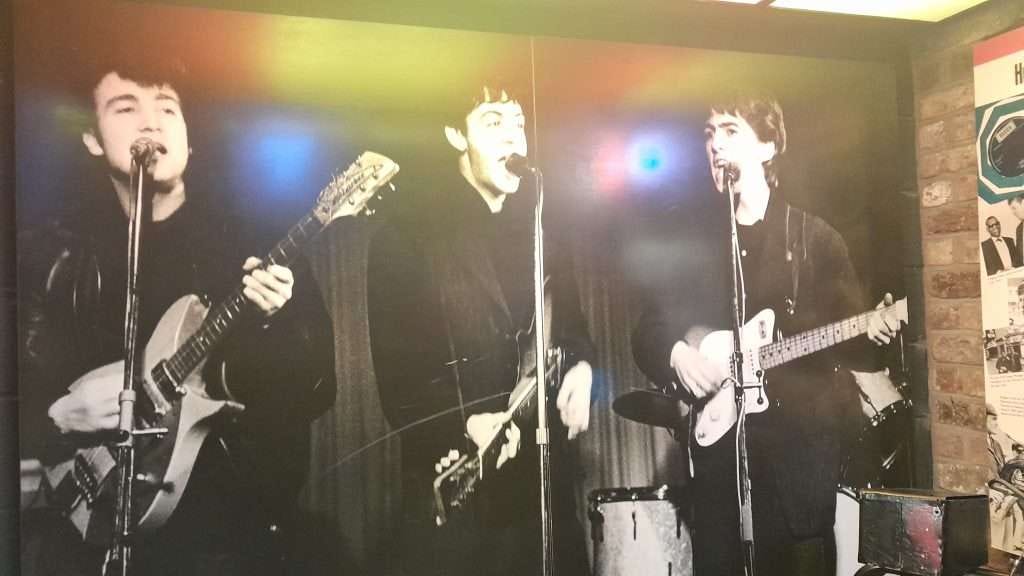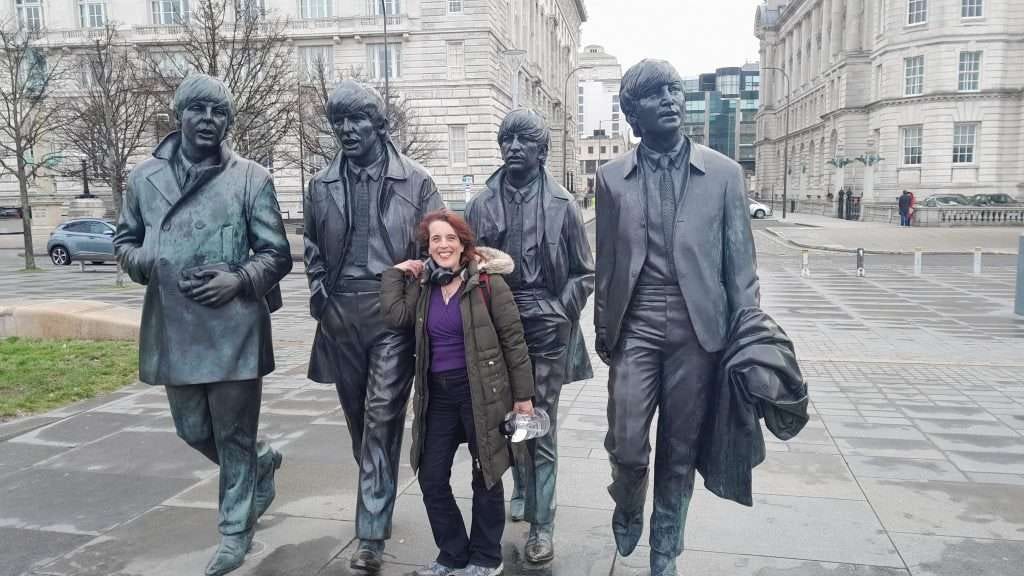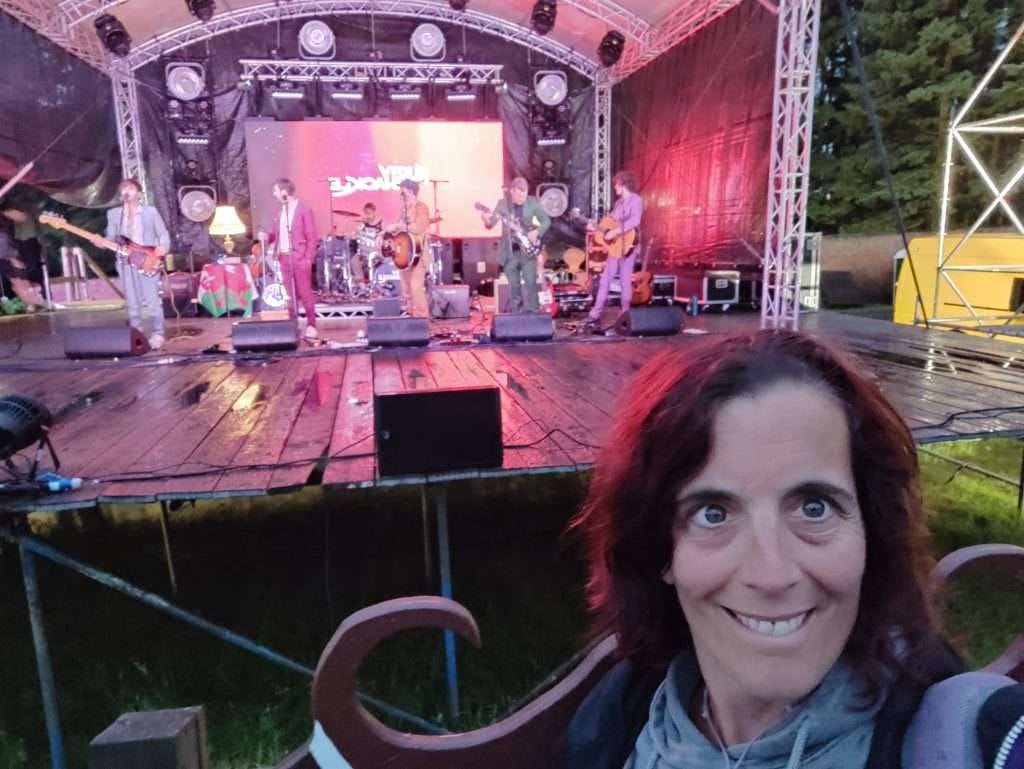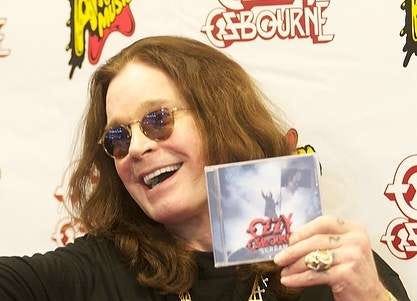It’s Sober Rock n Roll (and I Like It)
Between August 1960 and December 1962, a group of young Liverpudlians were making their name on the club circuit of Hamburg, Germany.
They were barely out of school. George, the youngest, was just 17 when they first arrived in the clubs. This resulted in his being deported for being underage, and they returned when he was old enough. They played long, hard days and nights, honing their craft and making a name for themselves. They were also discovering that rock n roll was a lot easier if they were high.

The Beatles in Hamburg (at The Beatles Story, Liverpool)
With a punishing schedule, they needed to stay awake and play for longer than their bodies were able to naturally. And so the drugs allowed them to pursue their dreams, and become, eventually, The Beatles that we all know and love.
Drug use and abuse continued throughout The Beatles’ time together and beyond. Marijuana, LSD, cocaine, heroin, alcohol and other drugs were prevalent in all their lives.
And they weren’t alone. Substance use to excess was common among musicians of their generation and beyond. Musicians like The Beatles, The Rolling Stones, Led Zeppelin and more became part of a mythology that says where there is rock n roll, there is excess.
But does it have to be that way?
Is the ‘rock n roll lifestyle’ really necessary to creativity, love of music and a ‘rock n roll’ attitude?
Ringo Starr has been sober since 1988, and is still touring and making music. Joe Perry of Aerosmith is quoted as saying “There was a time I thought I couldn’t enjoy rock ‘n’ roll unless I had heroin in me”. But he’s been sober since the early 80s, and still seems to enjoy rock n roll!
And so many of the rock n roll hall of fame are also living sober, it seems that maybe it’s possible to be a rock star and be sober.
Which has got to mean that it’s possible to be a rock fan and be sober too!
My life as a sober rock fan
I’ve loved The Beatles since I was a child. Always preferring their later music, or as I came to refer to it, their drug music.

With The Beatles
When I discovered weed and LSD, I could tell myself that these substances took me closer to my heroes. That the music was meant to be listened to stoned. That ‘If it’s good enough for George, it’s good enough for me’.
The musicians I worshipped all took drugs. Not just my ’60s heroes, but the contemporary indie and rock bands I loved as well. Going to see bands, and going to festivals meant that I had the perfect excuse to drink and get high. It was part of the package, sex and drugs and rock n roll innit?
And as my own addiction deepened, rock n roll seemed to offer me a way to justify my behaviour, so I didn’t need to look any closer.
Saved by a song
But as much as those music heroes gave me the justification for my drinking and drug use, ultimately, they saved me as well,
The Queens of the Stone Age song “I Appear Missing”, released when my life was falling apart around me, held up a big mirror to my life and showed me how lost I was. The realisation triggered a breakdown that saw my quitting my job and surrendering to the madness.
My enduring love of George Harrison had led me to Yoga several years previously, and I wanted to teach it one day. My solution to the breakdown and my failing mental health was not to seek medical help, but to begin teacher training.
This unexpectedly became my path to recovery, and I emerged from that 13 month course with 6 months of sobriety under my belt. I almost certainly wouldn’t have begun the course if I’d known that would be the outcome. But the person I became was delighted to be sober, and smoke free.
I still love music. Still love going to gigs. Still love festivals. Dance like no one is watching, even more now I am sober. And I can always remember the gig, and enjoy every moment of it.

Enjoying Rusty Shackle at Beardy Fok Festival
Sobriety has given me more rock n roll than drinking ever did!
Sober Rock Stars
So, who are these rock stars who are out there laying to rest the myth that you have to be wasted to rock?
There are so many! Both older hall of fame legends, and younger musicians are realising that their health, relationship, and even creativity all do better when they put down the drugs and booze and embrace a sober life.
Here are just 5 who are not only rocking sobriety but actively making life better for others as they do it.
Ozzy Osbourne

Having been an active drug user for many years, The Prince of Darkness’s struggles with alcohol and drug addiction were so bad that he was fired from Black Sabbath in 1979. His addiction was played out very publicly, and was littered with arrests and bizarre behaviour. He claims that he was stoned every day the reality TV series ‘The Obsournes’ was filmed, and during the time of the show, he also became addicted to prescription pain relief after a near fatal quad accident.
Ozzy began his recovery journey in 2006, and has enjoyed 9 years of continuous sobriety. Ozzy’s public addiction and recovery journey, and his willingness to talk openly about it, show that even when all seems hopeless, recovery is possible. He highlights the benefits to be found in asking for help, and staying committed to the recovery path.
And with the public support and recovery journey of his family, he highlights that addiction and recovery are not just about the individual. Families are both a vital source of support, but also need support themselves.
Elton John

Elton spent the early years of his career sinking deeper into alcohol and drug addiction. But in 1990, he recognised that he needed to make a change, and he entered recovery.
His sobriety saved his life and his career, and Elton has now got 33 years of sobriety behind him.
Elton established the Elton John Aids Foundation in 1992. The Foundation supports people living with HIV and also offers programs of addiction treatment.
Elton has been very open about his addiction and recovery, and shares his experiences candidly in his 2019 memoir “Me”. He frequently supports recovery centres and attends events to promote recovery and raise awareness of the importance of support and treatment for addiction.
Eminem

Eminem’s recovery journey has made him a powerful role model for many young people to follow his lead and pursue recovery. His brutal honesty in his music and interviews about his alcohol and painkiller addiction, recovery and life experiences have gone a long way to helping to overcome the stigma that still surrounds those of us in addiction or recovery.
Eminem as been mentored through his recovery by his friend Elton John who acted as his 12 step sponsor.
Eminem is outspoken about his experiences, and has shed a lot of light on the dangers and reality of prescription medication addiction, a hidden epidemic of suffering, with an estimated 6% of Americans believed to abuse prescription drugs each year.
These are just a few of the musicians who are still enjoying the rock n roll life, without the rock n roll excess.
Who is your favourite sober musician?
The post It’s Sober Rock n Roll (and I Like It) appeared first on Red Shoes Recovery.




